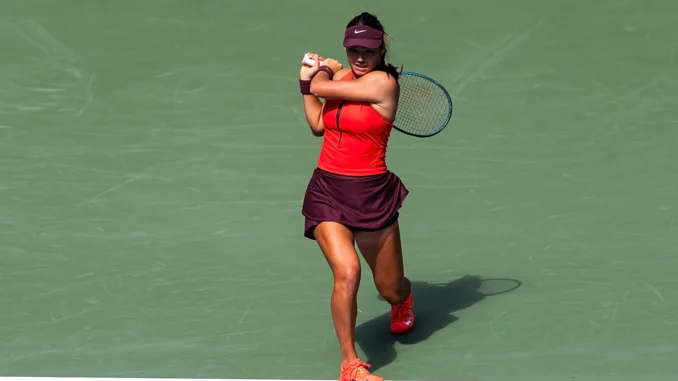
In the relentless grind of professional tennis, where every decision is a high-wire act balancing ambition, health, and legacy, Emma Raducanu has ignited a firestorm of debate with a choice that speaks volumes about her priorities. The 22-year-old British star, whose improbable 2021 US Open triumph as a qualifier etched her name in tennis lore, has opted to bypass Great Britain’s Billie Jean King Cup campaign in Shenzhen, China, to chase individual glory at the Korea Open in Seoul. With the Cup’s quarter-final against Japan looming on September 18, 2025, Raducanu’s last-minute withdrawal—favoring a WTA 500 event—has drawn sharp reactions, from captain Anne Keothavong’s measured disappointment to fans’ polarized takes on social media. Yet, for Raducanu, this isn’t a snub of national pride but a calculated leap toward rediscovering the form that once made her untouchable, driven by a new coaching alliance that could redefine her future.
Raducanu’s journey since that Flushing Meadows fairy tale has been a turbulent saga of dizzying highs and brutal setbacks. At 22, she’s weathered shoulder surgeries, ankle injuries, and the unrelenting spotlight as Britain’s tennis darling. Her 2025 season has been a rollercoaster: a grass-court title in Nottingham, a quarter-final run in Guadalajara, and a gritty third-round showing at the US Open against Elena Rybakina signal a flicker of her old magic. But inconsistency—marked by withdrawals and early exits—has kept her stuck around world No. 70. The Korea Open, running September 15-21, offers a lifeline: a chance to defend quarter-final points from 2024, face a stacked field including Iga Swiatek and Amanda Anisimova, and climb toward a seeded spot at the 2026 Australian Open. More crucially, it’s a proving ground to gel with her new coach, Francisco “Francis” Roig, the Spaniard whose work with Rafael Nadal’s 22 Grand Slam titles brings a pedigree Raducanu desperately needs. “It was a truly difficult decision,” she admitted after a rain-soaked 6-3, 6-4 victory over Jaqueline Cristian in Seoul, saving 11 of 12 break points in a 70-minute first set. “The Korea Open was a crucial time for me to get in sync with my new coach, Francis… I wanted to prioritize working with him and further developing myself.”
The Billie Jean King Cup, rebranded in 2020 to honor the sport’s equality trailblazer, is a sacred stage where national anthems fuel fierce camaraderie. Raducanu’s love for it is undeniable—she powered Britain to the 2024 semi-finals with three flawless singles wins. “I love the BJK Cup so much, and last year, I gave it my all despite the difficult circumstances,” she reflected, her voice tinged with regret. But her absence in Shenzhen, where Britain faces a Japan squad potentially led by Naomi Osaka, stings. Keothavong, a former top-50 player herself, didn’t hide her frustration. “Obviously disappointing,” she said before the tie, noting the late notice that forced a lineup overhaul with Katie Boulter, Sonay Kartal, Jodie Burrage, and Francesca Jones. Raducanu’s earlier absence from February’s qualifiers in The Hague—where she prioritized a Los Angeles training block—had already tested the team’s depth, with Boulter and Kartal stepping up to secure 2-1 victories over Germany and the Netherlands. Keothavong, however, remains defiant: “The girls are motivated to step up.”
Raducanu’s Seoul pivot is rooted in necessity. Her 2025, with 19 tournaments and a 26-18 record, marks her busiest season yet, but physical fragility persists. Roig, who joined her in Cincinnati and guided her US Open run, is her seventh coach since her US Open win—a carousel that underscores her quest for stability. His focus on conditioning and serve refinement could be transformative, especially after past injuries derailed her at this very event in 2022 and 2023. “Having the opportunity to develop with such an experienced coach was the main reason I decided to participate in the Asia Series, starting with this Korea Open,” she explained, her post-match candor revealing a player maturing into strategic self-preservation. Yet, her second-round loss to Barbora Krejcikova, hours before Britain’s Japan triumph, sparked online chatter—some lauding her focus, others questioning her loyalty.
The Cup’s September slot, clashing with the lucrative Asian swing, exposes a broader tension: team duty versus individual survival. Raducanu’s choice mirrors past stars like Johanna Konta, who faced similar scrutiny for prioritizing health. Critics argue it dilutes the Cup’s spirit, but supporters see empowerment—a woman navigating a sport where rankings dictate sponsorships and seedings. Britain’s squad, now in the semi-finals against a formidable United States featuring Coco Gauff and Jessica Pegula, carries a 4-0 singles record from Boulter and Kartal, hinting at upset potential. Keothavong’s mantra—“It’s about giving your best when it counts”—resonates from Shenzhen to Seoul, where Raducanu, fresh off a training block, eyes a deep run to silence doubters. “Even though it was the end of the season, I felt it was more important to work with an experienced coach ahead of the Asian swing,” she reiterated, her focus unwavering.
As the Korea Open’s humid courts beckon, Raducanu stands at a crossroads. A title could vault her into the top 50, setting the stage for bigger battles. Will this solo bet pay off, or will the Cup’s absence linger? “Tennis is a selfish sport at times, but that’s okay—it’s about giving your best when it counts,” she mused. With Roig’s wisdom and her own resolve, Raducanu’s next chapter is hers to write—one forehand, one fearless step, at a time.
Leave a Reply